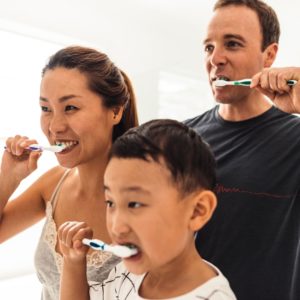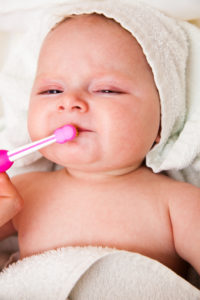 Myth: Fluoride treatments are only for children.
Myth: Fluoride treatments are only for children.
Fact: Fluoride treatments are beneficial for patients of all ages, as regular exposure to fluoride helps to strengthen enamel and prevent cavities from forming.
Myth: Fluoride is bad for your health.
Fact: In the proper amounts, fluoride can help protect tooth enamel from decay and reduce the risk of cavities. Studies have also shown that fluoride may reduce the risk of other dental issues, such as tooth sensitivity and gum disease. Patients who obtain too much fluoride may be at risk of fluorosis, but this is often rare in everyday individuals.
Myth: Once a cavity forms, it will never go away.
Fact: If a cavity is caught early enough, a professional fluoride treatment may be able to remineralize the damaged enamel. However, if the cavity is too large, a dental filling is necessary to repair the damaged area and restore the tooth’s function.
Myth: Fluoride treatments are uncomfortable.
Fact: At the practice of Dr. Kenneth Egger, fluoride treatments are completely painless and take just minutes to complete. The dental hygienist simply applies a varnish containing fluoride directly onto your teeth and then rinses it off after a few minutes.
Myth: Fluoride treatments are expensive.
Fact: Most dental insurance plans cover at least a portion of the cost of regular professional fluoride treatments, making them much more affordable than other dental procedures. Additionally, Dr. Kenneth Egger may offer discounted rates for fluoride treatments, so be sure to ask about any special offers available when visiting our office.
Myth: Fluoride treatments are unnecessary if you brush and floss regularly.
Fact: While regular brushing and flossing are essential for maintaining good oral health, remember that fluoride treatments can provide additional protection against cavities and tooth decay. So even if you practice excellent oral hygiene habits, professional fluoride treatments may be beneficial for keeping your smile healthy for many years to come!
Learn More About Fluoride
Dr. Kenneth Egger is an experienced dental provider in the Mount Pleasant, MI, community who understands the advantages of fluoride applications in the dentist’s chair. Call 989-773-3560 to request an appointment at our office and find out more about this and other preventative care solutions readily available.



 In past blogs on Dr. Egger’s site, we’ve discussed lots of stuff about kids and their teeth. Sealants, fluoride, baby teeth, thumb sucking, and other topics have been all about our younger patients.
In past blogs on Dr. Egger’s site, we’ve discussed lots of stuff about kids and their teeth. Sealants, fluoride, baby teeth, thumb sucking, and other topics have been all about our younger patients.



 It’s one of the millions of jobs a parent has to start your kids down the path to good oral hygiene. You, and they, will be glad you made the attentive effort. It helps to understand different factors about the baby teeth, so here’s some info from Dr. Egger.
It’s one of the millions of jobs a parent has to start your kids down the path to good oral hygiene. You, and they, will be glad you made the attentive effort. It helps to understand different factors about the baby teeth, so here’s some info from Dr. Egger.